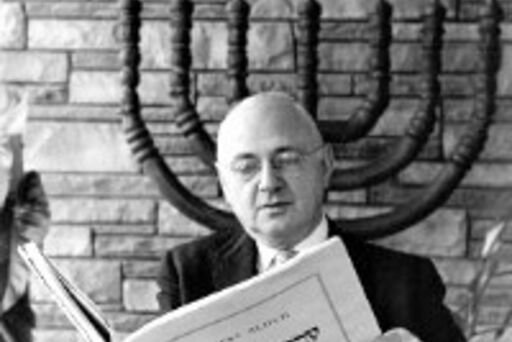Mandell: the Collector and the Collection

“The gathering of music and literature on music should only be the building of a bridge to study and research. For the true collector, his library is as much as his daily meals are. He obtains nourishment of a sort from both.” —Eric Mandell
Eric Mandell’s passion for collecting music was essential to who he was, and his life story is equally connected to the development of his collection. The collector and the collection both were born in pre-war Germany, transformed by the Holocaust, and given new life in the United States.
Mandell started collecting Jewish music at the age of fifteen. What began as a hobby evolved into a passion. Mandell, born in Gronau (Westphalia, Germany) moved to the Westphalian town of Bochum in 1922 at 20 years old to serve as the local Jewish community’s cantor, choir director, and schoolteacher. In Bochum, Mandell met Arno Nadel, a poet and composer. Twenty-four years Mandell’s senior, Nadel mentored the young cantor, elevating his musical senses and sensitizing Mandell to an even wider variety of Jewish music. Nadel believed in the majesty of German culture and the sincerity of Jewish music. He believed that Jewish music was a part of German culture, not a product of it. Mandell’s distaste for synagogues’ wholesale adoption of German music at the expense of indigenous religious types was learned from his friendship—mentorship, really—with Arno Nadel. Both believed, fervently, that it was a missed opportunity for German Jews to assimilate into the broader cultural atmosphere. Instead, they should aim to make their own mark on the larger society and provide to Germany a gift of an inherently Jewish variety of music.
Like Nadel, Mandell collected widely. That was the only way the young cantor could make sense of the hard-to-spot galaxy of Jewish music. With each manuscript, Mandell refined his sense of what could be considered part of the loose canon of modern Jewish music—and what needed to be left out.
Once Nazis came to power, Mandell made plans to leave Bochum in 1939. After a brief period spent in a work camp near Berlin, Mandell obtained a visa and moved to London, where he met his wife, Martha Wolff. Before then, Mandell sent his music library to relatives in Holland. He hoped there it would be safe. But Mandell’s cousins were forced into hiding and could not guard the music archive. The only other individual who knew the whereabouts of this precious collection was a local cantor. Whatever the case, when Mandell’s cousins resurfaced, most of the hidden music collection was gone.
Eric Mandell was crushed. He and his wife, Martha, managed to obtain papers to migrate to New York, where they disembarked in January 1941. Upon arrival, he searched for a cantorial position and was hired by Har Zion Temple in Philadelphia.
Mandell hoped to recover his lost library but eventually relented and started collecting anew. Philadelphia was a choice place to collect old things. A colonial city predating the American Revolution, secondhand book dealers and collectors made careers scouring old buildings for rare documents. Mandell frequented the shops of these collectors in South Philly, building relationships with book dealers who had a knack for sleuthing and securing unique manuscripts. Mandell also made biweekly pilgrimages to similar stores in New York, and special trips to Europe to purchase Jewish music.
By the mid-1950s, Mandell’s was known as a world-class collection. Above all, he prized items that once belonged to his friend, Arno Nadel. Nadel had reportedly transmitted his huge library to a non-Jewish friend before he was deported to Auschwitz, where he perished in 1943. Nadel’s daughter sold the composer’s work to Mandell. The latter considered it an honor to have recovered the materials once owned by the likes of Nadel, Maeir Levi, and Hugo Adler. Over time, Mandell expanded his collection to other areas of Jewish music.
In 1970, Eric Mandell donated his collection to Gratz College. The press release in the local newspapers declared that “with the acquisition of the Eric Mandell music collection, Gratz College becomes one of the most important music research centers in the United States.” In his recent report of the collection in 2023, the noted music scholar Edwin Seroussi offered that the Mandell collection “compares in scope and importance to those of HUC [Hebrew Union College] and JTS [Jewish Theological Seminary], as well as to the Jacob Michael Collection of Jewish Music at the National Library of Israel.” After a long fight with a devastating illness, Eric Mandell passed away in Philadelphia on February 6, 1988.